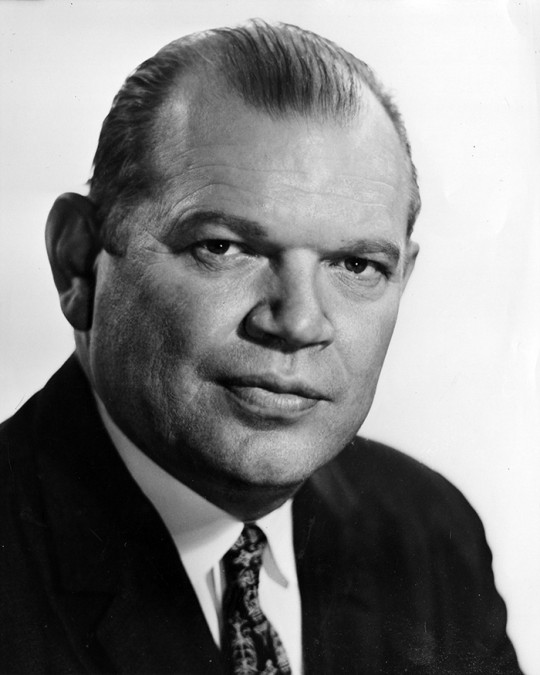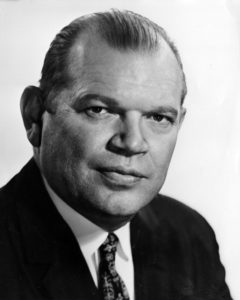Bill Dodd
Lieutenant governor Bill Dodd was a pivotal figure in the "Tidelands Dispute," the war of wills between state and federal authorities over offshore drilling revenue.

Courtesy of State Library of Louisiana.
Elected lieutenant governor in 1948, William Dodd became a key figure in the "Tidewater Dispute," wherein the federal government offered a compromise payment from offshore mineral rights, but Gov. Earl Long rejected the deal, and Louisiana lost everything.
Though he fell short of his goal of becoming governor of Louisiana, William J. “Bill” Dodd held several high offices in the state, including representative, auditor, president and member of the board of education, education superintendent, and lieutenant governor. As lieutenant governor, he was a pivotal figure in what became known as the “Tidelands Dispute,” a pitched war of wills in the late 1940s between state and federal authorities over revenue from offshore oil drilling in the Gulf of Mexico.
Dodd was born on November 25, 1909, in Liberty, Texas, but moved with his parents, Daniel and Nancy Dodd, to Sabine Parish during childhood. Except for a stint as a professional baseball player in Cody, Wyoming, Dodd was identified with Louisiana throughout his life.
He graduated from Louisiana Normal School (now Northwestern State University) in 1934 and taught afterward at Oakdale High School in Allen Parish. In 1939 he married a former student, Verone Ford, with whom he had two sons. A year later he ran for the Louisiana House of Representatives, encouraged, he claimed, by one of his students. Dodd defeated the incumbent with the help of his students and their families. As a former teacher, he would consistently support state funding for education.
Dodd volunteered for the US Army during World War II. While serving in the European theater as a lieutenant, he was reelected to his seat in the legislature. After his discharge in 1945, Dodd enrolled at Louisiana State University and graduated two years later with a law degree.
In 1948 Dodd was elected lieutenant governor. During that term he represented Louisiana before the federal commission overseeing the Tidelands settlement. In 1947 offshore oil drilling had begun with a well installed in sixteen feet of water about twelve miles south of Terrebonne Parish. Once the federal and state governments recognized the value that offshore waters represented in mineral rights, they began to jockey for control of offshore drilling revenues. In 1948 President Harry Truman’s administration offered to settle the dispute with what Dodd and Louisiana Attorney General Bolivar Kemp considered to be a generous compromise. Under the federal proposal, Louisiana would have gotten two-thirds of all revenues from mineral bonuses, leases, and royalties in the three-mile zone from the state’s coastline into the Gulf of Mexico, and 37.5 percent of all revenues beyond that area. Gov. Earl Long rejected the offer, however, at the urging of the powerful judge Leander Perez, who controlled lucrative drilling rights in Plaquemines Parish. Long thought the state should hold out for a larger share of the revenue, but the US Supreme Court sided with the federal government in 1950, and Louisiana lost everything. In his political memoir published in 1991, Dodd estimated that the Tidelands offer spurned by Long could have earned Louisiana more than $100 billion to that point, plus billions of dollars more in subsequent years.
Although identified as a Longite and elected lieutenant governor on the ticket that returned Earl Long to the governor’s mansion in 1948, Dodd never had a close relationship with the Long family. The governor preferred to communicate with his lieutenant in writing rather than in person, and he refused to support Dodd’s 1952 bid for governor.
In his 1952 campaign, Dodd pledged to reduce taxes and promised to increase benefits, including free college tuition and an old-age pension for state residents. He received only 11.9 percent of the vote in the first Democratic primary, and his leading opponent, Bob Kennon, went on to win the general election. Dodd’s poor showing did not diminish his influence in state politics. From 1952 to 1956, Dodd was a member of the powerful Louisiana Democratic State Central Committee. In 1956 he was elected state auditor—once again, alongside Earl Long’s return to the governorship.
Dodd ran once more for governor in the 1959 primary but finished fourth, with only 10.1 percent of the vote; Jimmie Davis eventually won the governorship. Dodd was consoled a year later with his election to the Louisiana State Board of Education and to state superintendent of education in 1964, an office he held until losing his bid for a third term in 1971. As superintendent, Dodd implemented the court-ordered desegregation of Louisiana’s public schools and fended off attacks by segregationists.
Dodd was defeated in the 1975 primary election, where he ran one last time for education superintendent. During his final years, he played the role of elder statesman in Louisiana politics. Dodd died of cancer on November 16, 1991. Dodd Hall on the Northwestern State University campus is named for him.
